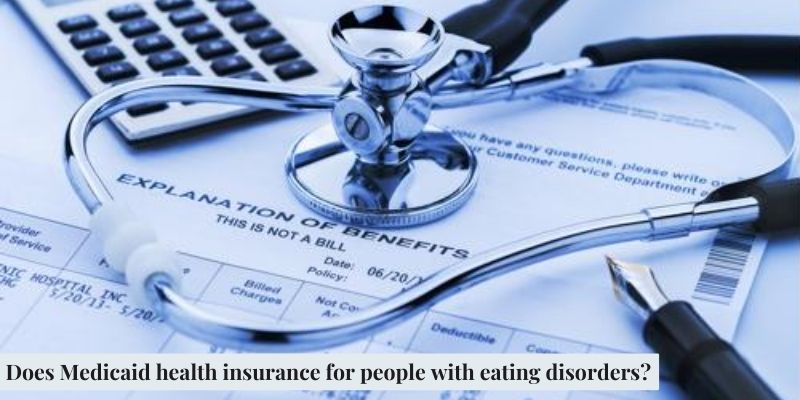What is health insurance for people with eating disorders? No matter a person’s age, sex, race, body weight, or health insurance coverage, eating disorders can impact anyone.
If ignored, these conditions can become hazardous or even fatal. However, treatment is frequently expensive, and it can be difficult to locate the right coverage to aid in your rehabilitation.
You could have more concerns about how and whether your policy will cover treatment for eating disorders if you have Medicaid health insurance. In this article, newvehiclez.com will discuss the best health insurance for people with eating disorders.
Contents
Does Medicaid health insurance for people with eating disorders?
Medicaid may be able to assist you in covering the cost of therapy and other forms of eating problem care. There are restrictions on what the coverage will cover, though. Additionally, in order to qualify for coverage, policyholders must fulfill a number of requirements.

According to the legislation, Medicaid must cover mental health issues just like any other medical issue.
Medicaid is the main source of funding for mental health services in the US. When it comes to paying for mental health care, the organization’s role is becoming more and more important.
Contact the organization, visit a Medicaid Health Home or a facility that accepts Medicaid, review your policy, or travel to a facility that accepts Medicaid to learn more about how you can use Medicaid eating disorder coverage for your treatment.
What Will Medicaid Cover?
All state Medicaid programs for mental health issues cover eating disorders. However, the types of treatments that are covered could alter.
Children and adolescents who qualify for the Children’s Health Insurance Program (CHIP) are provided with crucial mental and behavioral health coverage. Adult coverage, on the other hand, is decided on a state-by-state basis.

Levels of Care Covered by Medicaid
Medicaid health insurance covers all eating disorder therapies, including inpatient, residential, partial hospitalization, and outpatient care.
Before transferring to more intensive levels of care, patients must typically initially seek outpatient care. There may be some exceptions, such as sudden medical needs.
Get in touch with a Medicaid agent for further details.
Types of Treatment Covered by Medicaid
Medicaid offers a variety of therapies and treatments for mental health, such as:
- Group and family therapy programs
- Nutritional counseling and monitoring
- Cognitive Behavioral Therapy (CBT)
- Dialectical Behavior Therapy (DBT)
- Acceptance and Commitment Therapy (ACT)
- Experiential therapy
- Process groups
- Mindfulness
- Additional medical care
It’s also important to note that there are limitations on the lengths of therapy and treatment programs covered under Medicaid.
What Does Medicaid Not Cover?
Medicaid will only pay for procedures that fall under its definition of necessary and reasonable medical care. Anything outside of these categories won’t be covered.
“Medically necessary” refers to treatments based on studies that have had positive outcomes in the past. This includes the medical expertise and tools needed to identify and treat eating problems. Anything that does not adhere to accepted medical standards is not covered by Medicaid.

It’s also vital to remember that Medicaid eating disorder coverage does not cover services rendered by household members or by private nursing facilities. If bandages, adult diapers, or other disposables are needed for the treatment of eating disorders, they typically won’t be covered either.
What are Medicaid Health Homes?
Government-run treatment facilities known as Medicaid Health Homes provide Medicaid recipients with services. They provide services for a range of ailments, including eating problems.
Each state typically has a number of Medicaid health homes. More details are available from the Centers for Medicare & Medicaid Services.
Other Treatment Centers that Accept Medicaid
A number of hospitals and rehabilitation facilities also offer Medicaid eating disorder insurance for the treatment of eating disorders in addition to Medicaid Health Homes.
Make important to find out if the treatment facilities or programs you are considering accepting Medicaid before committing to them.
Medicaid: How to Begin the Treatment Process
Obtaining a formal diagnosis is typically the first step in being covered by health insurance for an eating disorder. This will assist treatment facilities in determining the kind and level of therapy you would require, in addition to assisting insurance firms in comprehending the severity of the problem.
You can ask Medicaid for a case manager once you receive a formal diagnosis. Your case manager will assist you in finding a suitable treatment facility and in making the necessary preparations to start receiving covered care. When it comes to navigating the process of receiving treatment and making sure your care is covered by Medicaid, your case manager will be a valuable resource of assistance and guidance.
People with eating disorders may face negative effects on their physical and mental health, which typically worsen over time if left untreated. Electrolyte imbalance, organ damage, and even death are some of the complications.
This is why, regardless of your insurance situation, it’s imperative to seek treatment for an eating disorder. It’s critical to keep in mind that healing is possible and that you are not traveling alone. You can obtain the assistance you need to manage your disorder and adopt a better lifestyle with the correct support.
Contacting the Medicaid office in your state is the easiest approach to locate eating disorder treatment facilities that take Medicaid. They should be able to provide information about locations and services, as well as a list of approved providers. To learn more about the resources in your region, you can also get in touch with your neighborhood hospital or health department.
